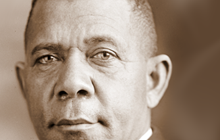“It is a curious thing, Harry, but perhaps those who are best suited to power are those who have never sought it. Those who, like you, have leadership thrust upon them, and take up the mantle because they must, and find to their own surprise that they wear it well.” ― J.K. Rowling, Harry Potter and the Deathly Hallows
Library and bookstore shelves sag with book after book about leadership. What are the qualities and habits of a leader? What techniques and secrets can one leader share with those who aspire to be leaders as well? Many believe leadership can be learned and that leaders are those who simply know and do the right combination of things to inspire and motivate others. Others believe leadership is innate. They don’t believe you can do much at all to change whether you are a leader. This FTU course examines both sides of this debate and guides the student in determining his or her own leadership potential.
As you start this course, you should identify a mentor you can spend some time with. This mentor should be someone you spend time discussing leadership and the content of this course with. You should spend a minimum of 8 hours with this person and they should have at least ten years of experience in leadership. You should make them aware of this course and its content. There will be some questions later on that will inquire about this relationship.
This course is based on an article from the Intercollegiate Review, in which R.J. Snell sets forth the qualities that employers look for in today’s market. He then explains what types of college majors seem to best foster those qualities. We begin the course with Snell’s introduction.
—
The Qualities of a Great Leader: Do You Measure Up?
By R.J. Snell (Source)
In a recent essay, Mark Shiffman notes that in the fiercely competitive but nonetheless gloomy context in which university students find themselves, many opt to “major in fear.” Fear that they won’t find work or pay off student loans. Fear of lost opportunities or moving home with mom and dad.
Consequently, Shiffman states,
“it’s easy to see why The Hunger Games is the novel of their generation. The trilogy depicts adolescents rigorously trained by adults for desperate but meaningless life-or-death competitions. Its dark emptiness resonates with students’ latent unease and dissatisfaction with their educational regimen, as well as with their worry that they’re all honed up with no place to go.”
In this fearful state, students skip the humanities in favor of something “more practical”, perhaps more suited to pre-professional training. Only those with leisure can afford to study philosophy, and fearful people have no luxury for leisure, or so it is thought.
Never mind that many employers actively seek out English or Classics majors; that philosophy students, statistically, end up with greater earning power than an average business student; that both medical and engineering programs are pushing students to learn the arts or history. Never mind that Jean Paul Getty, perhaps the richest man in the world at the time of his death, employed readers of Greek and Latin to run Getty Oil. This seems quite romantic, and yet his reasons were entirely pragmatic: “Asked why he insisted on employing classicists in key positions, he answered bluntly: ‘They sell more oil.’”
Version 1.2









_17422494921.png )
